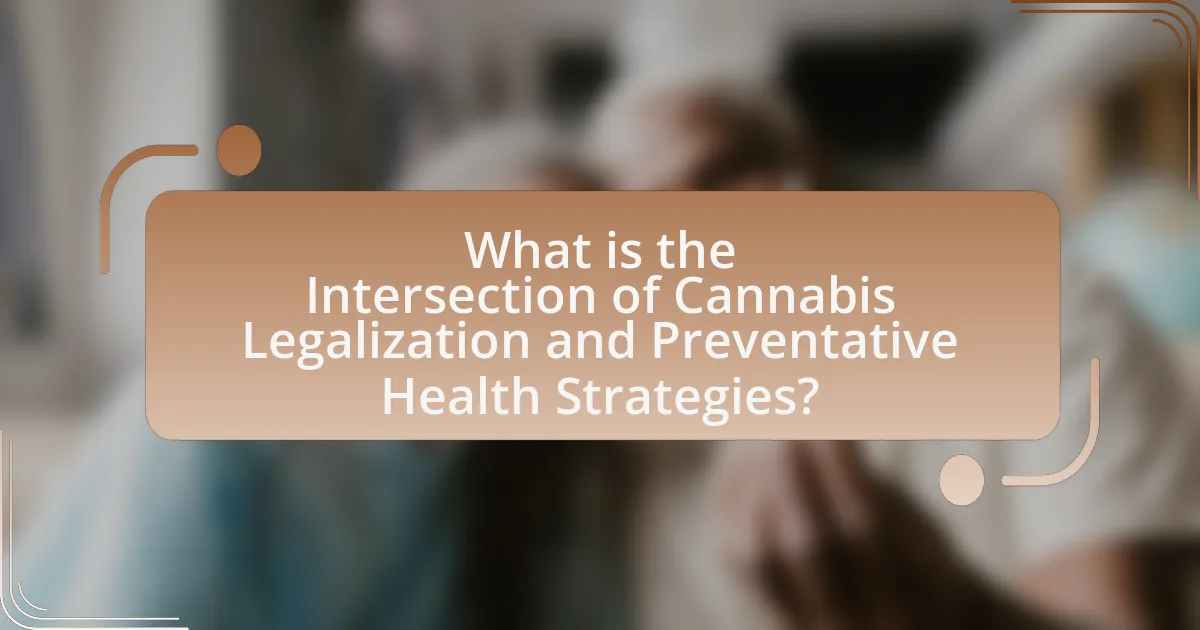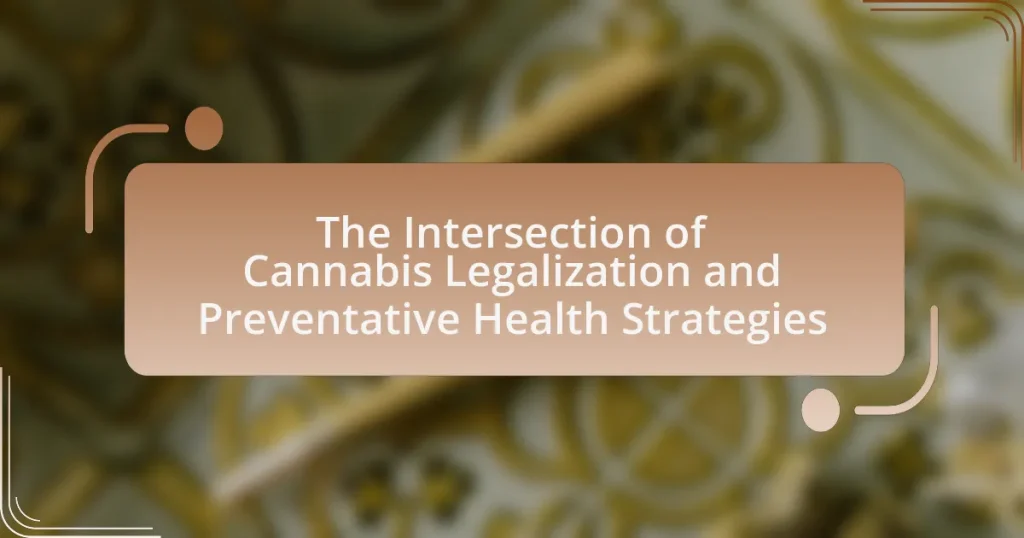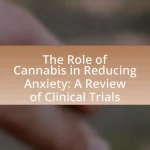The article examines the intersection of cannabis legalization and preventative health strategies, highlighting the potential therapeutic benefits of cannabis in managing chronic conditions and promoting overall health. It discusses how legalization facilitates research, improves access to alternative treatments, and supports public health initiatives through better regulation and education. Key components of preventative health strategies related to cannabis include education, regulation, and harm reduction, while the article also addresses the influence of societal attitudes on health policy and the challenges posed by regulatory inconsistencies and research limitations. Additionally, it explores the potential health benefits of cannabis, particularly in mental health and chronic disease prevention, and outlines best practices for health professionals in discussing cannabis with patients.

What is the Intersection of Cannabis Legalization and Preventative Health Strategies?
The intersection of cannabis legalization and preventative health strategies lies in the potential for cannabis to be utilized as a therapeutic agent in managing chronic conditions and promoting overall health. Legalized cannabis can facilitate research into its medicinal properties, which may lead to the development of preventative health measures, such as using cannabinoids to alleviate symptoms of anxiety, chronic pain, and inflammation. For instance, studies have shown that cannabinoids can reduce the frequency of seizures in epilepsy patients, thereby preventing further health complications. Additionally, the legalization of cannabis can improve access to alternative treatments, potentially reducing reliance on opioids and associated overdose risks. This shift in treatment paradigms aligns with preventative health strategies aimed at reducing the burden of chronic diseases and enhancing quality of life.
How does cannabis legalization impact public health initiatives?
Cannabis legalization positively impacts public health initiatives by enabling better regulation, research, and education regarding cannabis use. Legalization allows governments to implement quality control measures, ensuring safer products for consumers, which can reduce health risks associated with unregulated cannabis. For instance, states that have legalized cannabis have reported a decrease in opioid prescriptions and related overdoses, as evidenced by a study published in the Journal of the American Medical Association, which found that states with medical cannabis laws experienced a 25% reduction in opioid overdose deaths. Furthermore, legalization facilitates funding for public health campaigns aimed at educating the public about responsible use and potential health effects, thereby promoting informed decision-making among users.
What are the key components of preventative health strategies in relation to cannabis?
Key components of preventative health strategies in relation to cannabis include education, regulation, and harm reduction. Education focuses on informing the public about the effects of cannabis, potential risks, and responsible use, which is essential for informed decision-making. Regulation involves establishing legal frameworks that control the quality, distribution, and marketing of cannabis products to ensure consumer safety and minimize misuse. Harm reduction strategies aim to mitigate negative health outcomes associated with cannabis use, such as promoting safer consumption methods and providing access to support services for individuals with substance use disorders. These components collectively contribute to a comprehensive approach to public health in the context of cannabis legalization.
How does cannabis use influence health outcomes in preventative care?
Cannabis use can influence health outcomes in preventative care by potentially reducing the incidence of certain chronic conditions and improving overall health management. Research indicates that cannabinoids may have anti-inflammatory properties, which can aid in the prevention of diseases such as diabetes and cardiovascular issues. A study published in the American Journal of Medicine found that cannabis users had lower fasting insulin levels and smaller waist circumferences compared to non-users, suggesting a protective effect against metabolic syndrome. Additionally, cannabis may enhance mental health outcomes, as evidenced by research in the Journal of Affective Disorders, which shows that cannabis can alleviate symptoms of anxiety and depression, thereby promoting better health behaviors and adherence to preventative care measures.
Why is the intersection of cannabis legalization and health strategies significant?
The intersection of cannabis legalization and health strategies is significant because it allows for the integration of cannabis into public health frameworks, potentially improving patient outcomes and reducing healthcare costs. Legalization facilitates research into the therapeutic benefits of cannabis, which can lead to evidence-based health strategies that address conditions such as chronic pain, anxiety, and epilepsy. For instance, a study published in the Journal of the American Medical Association found that states with medical cannabis laws experienced a 25% reduction in opioid overdose deaths, highlighting the potential of cannabis as an alternative treatment option. This intersection also promotes harm reduction strategies, ensuring that cannabis use is safe and regulated, which can mitigate risks associated with unregulated markets.
What historical context has shaped the current landscape of cannabis legalization?
The historical context that has shaped the current landscape of cannabis legalization includes the criminalization of cannabis in the early 20th century, particularly with the Marihuana Tax Act of 1937, which effectively banned its use and cultivation in the United States. This act was influenced by racial and political factors, leading to a stigma that persisted for decades. The War on Drugs in the 1980s further entrenched negative perceptions and legal penalties associated with cannabis, resulting in mass incarceration and social inequities. However, the late 20th and early 21st centuries saw a shift, beginning with California’s Proposition 215 in 1996, which legalized medical cannabis, followed by a wave of states adopting similar laws. By 2023, numerous states and countries have legalized cannabis for recreational use, reflecting changing public attitudes and recognition of its potential health benefits, as well as economic opportunities. This evolution is supported by research indicating therapeutic uses of cannabis, such as pain relief and anxiety reduction, which have contributed to its acceptance in health strategies.
How do societal attitudes towards cannabis affect health policy?
Societal attitudes towards cannabis significantly influence health policy by shaping public opinion, legislative actions, and funding priorities. When a majority of the population supports cannabis legalization, policymakers are more likely to enact laws that reflect these views, leading to the establishment of regulatory frameworks for cannabis use. For instance, in the United States, states that have legalized cannabis often cite public support as a key factor in their decisions, with surveys indicating that over 60% of Americans favor legalization as of 2021. This shift in societal perception can also redirect health funding towards research on cannabis’s medicinal benefits and its role in preventative health strategies, as seen in states like California, where cannabis research initiatives have been funded to explore its therapeutic potential.

What are the potential health benefits of cannabis in preventative health?
Cannabis has potential health benefits in preventative health, including anti-inflammatory properties, pain relief, and anxiety reduction. Research indicates that cannabinoids, such as CBD, can modulate the immune system, potentially reducing the risk of chronic diseases linked to inflammation. A study published in the Journal of Pain Research found that cannabis can effectively alleviate chronic pain, which may prevent the progression of conditions like arthritis. Additionally, cannabis has been shown to reduce anxiety and stress, contributing to better mental health outcomes, as evidenced by a review in the Journal of Psychopharmacology that highlights its anxiolytic effects. These properties suggest that cannabis may play a role in enhancing overall health and preventing disease.
How can cannabis contribute to mental health prevention strategies?
Cannabis can contribute to mental health prevention strategies by providing therapeutic benefits that alleviate symptoms of anxiety, depression, and stress. Research indicates that cannabinoids, particularly CBD, can reduce anxiety levels and improve mood, which may prevent the onset of more severe mental health issues. A study published in the Journal of Psychopharmacology found that CBD significantly reduced anxiety in participants during public speaking tasks, demonstrating its potential as a preventive measure against anxiety disorders. Additionally, cannabis can promote relaxation and improve sleep quality, both of which are crucial for maintaining mental well-being and preventing mental health deterioration.
What specific mental health conditions may benefit from cannabis use?
Cannabis use may benefit specific mental health conditions such as anxiety disorders, post-traumatic stress disorder (PTSD), and depression. Research indicates that cannabinoids, particularly cannabidiol (CBD), can reduce anxiety and improve mood by interacting with the endocannabinoid system, which plays a role in regulating emotional responses. A study published in the Journal of Psychopharmacology found that CBD significantly reduced anxiety in participants with social anxiety disorder during public speaking tasks. Additionally, a review in the Journal of Affective Disorders highlighted the potential of cannabis in alleviating symptoms of PTSD, including nightmares and flashbacks. These findings support the notion that certain mental health conditions may find therapeutic benefits through cannabis use.
How does cannabis compare to traditional mental health treatments?
Cannabis is often considered an alternative to traditional mental health treatments, such as psychotherapy and pharmacotherapy. Research indicates that cannabis may alleviate symptoms of anxiety, depression, and PTSD, with some studies showing that approximately 30% of users report significant symptom relief. In contrast, traditional treatments typically involve a combination of medications, like SSRIs, and therapeutic approaches, which can take weeks to show effects and may have side effects. For instance, a study published in the Journal of Affective Disorders found that cannabis use was associated with a reduction in anxiety symptoms in patients who did not respond to conventional treatments. However, the efficacy and safety of cannabis as a mental health treatment remain subjects of ongoing research, with varying results across different populations and conditions.
What role does cannabis play in chronic disease prevention?
Cannabis may play a role in chronic disease prevention by potentially reducing inflammation and pain, which are key factors in many chronic conditions. Research indicates that cannabinoids, the active compounds in cannabis, possess anti-inflammatory properties that can benefit conditions such as arthritis and cardiovascular diseases. A study published in the Journal of Clinical Investigation found that cannabinoids can modulate immune responses, suggesting a mechanism through which cannabis may help prevent chronic diseases linked to inflammation. Additionally, cannabis has been associated with improved appetite and sleep, which are crucial for overall health and can influence the progression of chronic diseases.
Which chronic diseases might be mitigated through cannabis use?
Cannabis use may mitigate several chronic diseases, including chronic pain, multiple sclerosis, epilepsy, and inflammatory bowel disease. Research indicates that cannabinoids can reduce pain and inflammation, which are key factors in chronic pain conditions. A study published in the Journal of Pain found that cannabis significantly reduced chronic pain in patients, demonstrating its potential as a therapeutic option. Additionally, cannabis has shown efficacy in managing muscle spasms associated with multiple sclerosis, as evidenced by clinical trials that report improved patient outcomes. Furthermore, cannabis is being explored for its anticonvulsant properties in epilepsy, with some studies indicating a reduction in seizure frequency. Lastly, patients with inflammatory bowel disease have reported symptom relief through cannabis use, supported by research highlighting its anti-inflammatory effects.
How does cannabis affect lifestyle factors related to chronic disease?
Cannabis affects lifestyle factors related to chronic disease by influencing dietary habits, physical activity levels, and mental health. Research indicates that cannabis use can lead to increased appetite, often referred to as “the munchies,” which may result in higher caloric intake and potential weight gain, impacting obesity-related chronic diseases. Additionally, some studies suggest that cannabis may reduce anxiety and stress, potentially leading to improved mental health outcomes; however, excessive use can also contribute to mental health issues. Furthermore, cannabis users may exhibit varying levels of physical activity, with some studies indicating that moderate use does not significantly hinder exercise routines, while others suggest it may lead to a more sedentary lifestyle. Overall, the relationship between cannabis use and lifestyle factors is complex and can vary widely among individuals, necessitating further research to fully understand its implications on chronic disease management.

What challenges exist at the intersection of cannabis legalization and health strategies?
Challenges at the intersection of cannabis legalization and health strategies include regulatory inconsistencies, public health concerns, and insufficient research on health impacts. Regulatory inconsistencies arise because cannabis remains illegal at the federal level in many countries, complicating the development of cohesive health strategies. Public health concerns involve potential increases in substance abuse, impaired driving, and mental health issues, which necessitate comprehensive health education and prevention programs. Additionally, insufficient research on the long-term health effects of cannabis use limits the ability of health professionals to create informed guidelines and policies, as evidenced by the National Academies of Sciences, Engineering, and Medicine’s report highlighting the need for more rigorous studies on cannabis’s health effects.
What regulatory hurdles impact the integration of cannabis into health strategies?
Regulatory hurdles impacting the integration of cannabis into health strategies include federal prohibition, lack of standardized dosing, and limited research funding. Federal prohibition in many countries, including the United States, restricts healthcare providers from prescribing cannabis and limits its use in clinical settings. Additionally, the absence of standardized dosing guidelines complicates the safe administration of cannabis for medical purposes, leading to variability in patient outcomes. Furthermore, limited research funding hampers the ability to conduct comprehensive studies on cannabis efficacy and safety, which is essential for its acceptance in health strategies. These factors collectively hinder the effective incorporation of cannabis into mainstream healthcare practices.
How do varying state laws affect health practitioners’ ability to recommend cannabis?
Varying state laws significantly affect health practitioners’ ability to recommend cannabis by establishing different legal frameworks for its use and prescription. In states where cannabis is fully legalized for medical or recreational use, health practitioners can recommend it without legal repercussions, while in states with strict prohibitions, such recommendations may expose practitioners to legal risks or professional disciplinary actions. For instance, as of 2023, 38 states and Washington D.C. have legalized medical cannabis, allowing licensed healthcare providers to recommend it, whereas states like Idaho maintain strict prohibitions, limiting practitioners’ ability to discuss or recommend cannabis as a treatment option. This legal landscape creates disparities in patient access to cannabis-based therapies and influences the clinical practices of health professionals across the United States.
What are the implications of cannabis research limitations on health strategies?
Cannabis research limitations significantly hinder the development of effective health strategies. These limitations result in insufficient data regarding the safety, efficacy, and potential therapeutic benefits of cannabis, which impedes healthcare providers from making informed decisions. For instance, a lack of comprehensive clinical trials restricts understanding of dosage, delivery methods, and long-term effects, leading to uncertainty in prescribing practices. Furthermore, the absence of standardized regulations and quality control in cannabis products complicates the establishment of reliable health guidelines. This gap in research can lead to public health risks, as individuals may use cannabis without adequate knowledge of its effects, potentially exacerbating health issues rather than alleviating them.
How can health professionals navigate the complexities of cannabis legalization?
Health professionals can navigate the complexities of cannabis legalization by staying informed about local laws, understanding the pharmacology of cannabis, and engaging in ongoing education. Knowledge of state-specific regulations is crucial, as cannabis laws vary significantly across jurisdictions, impacting prescribing practices and patient education. Additionally, health professionals should familiarize themselves with the therapeutic uses and potential risks associated with cannabis, supported by research such as the National Academies of Sciences, Engineering, and Medicine report, which highlights both benefits and adverse effects of cannabis use. Continuous professional development through workshops and seminars can further enhance their ability to provide evidence-based guidance to patients regarding cannabis use in the context of preventative health strategies.
What best practices should health professionals adopt when discussing cannabis with patients?
Health professionals should adopt a patient-centered approach when discussing cannabis with patients. This involves actively listening to patients’ concerns, providing evidence-based information about the benefits and risks of cannabis use, and considering individual patient circumstances, such as medical history and current medications. Research indicates that effective communication can enhance patient understanding and decision-making regarding cannabis, as highlighted in a study published in the Journal of Cannabis Research, which emphasizes the importance of tailored discussions to address specific patient needs and preferences.
How can health education programs incorporate cannabis information effectively?
Health education programs can effectively incorporate cannabis information by integrating evidence-based research on its health effects, legal status, and safe usage guidelines into their curricula. This approach ensures that participants receive accurate and relevant information, which is crucial given the evolving landscape of cannabis legalization. For instance, studies such as “The Health Effects of Cannabis and Cannabinoids” published by the National Academies of Sciences, Engineering, and Medicine in 2017 provide comprehensive insights into both the therapeutic benefits and potential risks associated with cannabis use. By utilizing such credible sources, health education programs can foster informed discussions, promote responsible use, and address misconceptions surrounding cannabis, ultimately enhancing public health outcomes.
What practical steps can be taken to enhance the intersection of cannabis and preventative health?
To enhance the intersection of cannabis and preventative health, implementing educational programs that inform healthcare providers and the public about the benefits and risks of cannabis use is essential. These programs should focus on evidence-based research, such as studies indicating that cannabinoids may help manage chronic pain, reduce anxiety, and improve sleep quality, thereby potentially decreasing the need for more harmful pharmaceuticals. Additionally, integrating cannabis into wellness initiatives, such as stress management workshops or pain management clinics, can promote its use as a preventative health measure. Research from the National Academies of Sciences, Engineering, and Medicine highlights that cannabis can be effective in treating certain medical conditions, which supports its role in preventative health strategies.


